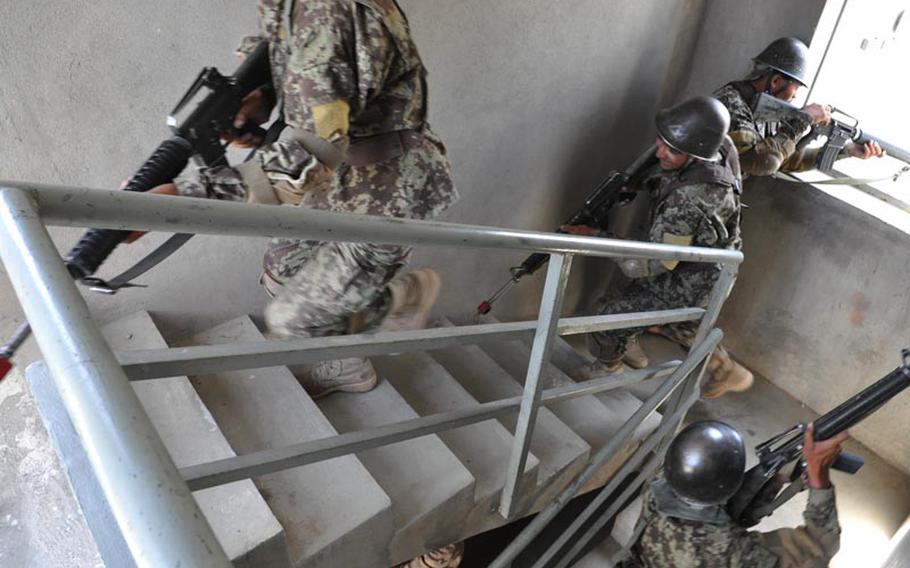
Afghan troops train at the Kabul Military Training Center while being advised by Canadian troops. This year has seen a spike in incidents of Afghan troops killing international troops, with trainers and advisers especially vulnerable. (Heath Druzin/Stars and Stripes)
KABUL — U.S. soldiers responding to a report of a shooting in Zabul province came upon a grisly scene Sunday at a remote observation post: four comrades and an Afghan policeman dead and two Americans wounded in another attack on U.S. forces by their allies, in what has been a particularly deadly weekend in Afghanistan.
The deaths come on the heels of another so-called green-on-blue attack that killed two British soldiers, and as coalition military leaders and their Afghan counterparts scramble to implement measures against a rising tide of fratricide, with Sunday’s shooting raising the alarming specter of a coordinated attack involving multiple Afghan troops.
The observation post near Forward Operating Base Mizan was manned by six Americans and six Afghan National Policemen. When U.S. troops responded to a report of a shooting they found four of their comrades dead, two wounded, and one Afghan policeman dead, according to a coalition spokesman.The other five Afghan policemen were gone and the spokesman said it is unclear if they had been involved in the attack, as the two witnesses are still receiving medical care.
In the past two days, six coalition soldiers have been killed by Afghan counterparts and insurgents launched a brazen attack on the coalition’s main base in Helmand province that left two troops dead and nine injured, with six Marine Corps Harrier fighter jets destroyed and two more significantly damaged.
According to an Associated Press tally, there have been 51 coalition troops killed this year in green-on-blue attacks — now being called “insider attacks by the coalition — where members of the Afghan security forces or insurgents in friendly uniforms have turned their weapons on their allies, accounting for about 15 percent of all coalition deaths and severely straining trust between the coalition and their Afghan partners.
Officials confirmed the deaths to Stars and Stripes following reports by U.S. personnel in Zabul province of a “green on blue” incident near Forward Operating Base Mizan, a small, isolated outpost in the mountainous province that borders Pakistan.
Soldiers at Forward Operating Base Lagman, in Zabul’s provincial capital of Qalat, were woken up about 4 a.m. Sunday by an announcement over loud speakers asking that all personnel be accounted for by their units.
Officials at the base told Stars and Stripes there had been a green-on-blue incident near Mizan and that some units had suspended training with Afghan security forces.
U.S. troops are always aware of the insider threat but adjust their approach to Afghan personnel depending on the situation, said Lt. Col. Chuck Rush, who is leading a team of military advisers working with the Afghan National Army at Forward Operating Base Apache, a short chopper ride from FOB Mizan.
“You always err on the side of force protection but there is a balance of protecting yourself and accomplishing our mission, which involves working with the Afghan Army every day,” he said last week. “If I was in a meeting with the Afghan brigade commander in full (body armor) it would send the wrong message to him about the level of our relationship.”
Rush said he and the other advisers at Apache have worked hard to build positive relationships with the Afghans and to be culturally sensitive.
“This culture is based on relationships and honor and we do honor our best to respect that,” he said.
The Afghan military is in the process of re-investigating the backgrounds of all 350,000 troops in their ranks as well as producing a pamphlet on Western culture aimed at reducing conflicts between Afghan and coalition troops. For their part, coalition leaders have promised better cultural education and has also implemented so-called guardian angel programs, where armed soldiers stand guard at sensitive meetings.
With all international combat troops scheduled to leave Afghanistan by the end of 2014, coalition militaries are working to transition to a smaller training and advising mission that will rely heavily on trust between Afghans and their Western advisers.
robsons@pstripes.osd.mildruzinh@stripes.osd.milTwitter: @Druzin_Stripes